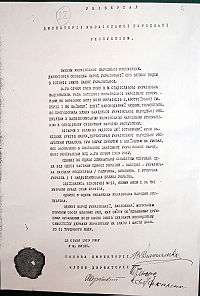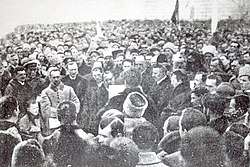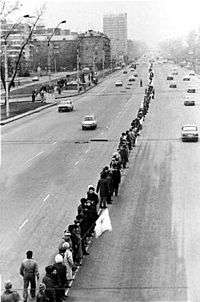Act Zluky
The Act Zluky (Ukrainian: Акт Злуки, IPA: [ˈɑkt ˈzlukɪ], "Unification Act") was an agreement signed on 22 January 1919, by the Ukrainian People's Republic and the West Ukrainian People's Republic on the St Sophia Square in Kiev. Since 1999 the Day of Unity of Ukraine, celebrated every year on 22 January to mark the signing of the treaty, is a state holiday;[2][3] but not a public holiday.[4]

| Day of Unity of Ukraine | |
|---|---|
2011 Kyiv celebration with giant Ukrainian flag | |
| Celebrations | Human chains and flashmobs in various Ukrainian cities[1] |
| Date | 22 January |
| Next time | 22 January 2021 |
| Frequency | annual |

History
The agreement was aimed at creating a unified Ukrainian state, a movement long-awaited by the intelligentsia on both sides.[5] However, the Act Zluky was regarded as purely symbolic in that both governments still retained their own separate armies, administrations and government structure.[5]
The text of the universal made by the Directorate of the Ukrainian People's Republic:
The territory of Ukraine, divided over the centuries, including Galicia, Bukovyna, Carpathian Ruthenia, and Dnieper Ukraine will now become a great united Ukraine. Dreams, for which the best sons of Ukraine fought and died for, have come true.
According to the treaty Galicia would become an autonomous part of Ukraine.[6]
However Ukraine was unable to gain independence and in December 1920 the Ukrainian SSR of the Soviet Union was established comprising most the territory of the Ukrainian People's Republic.[7] The territories of the West Ukrainian People's Republic became mostly part of Poland.[7] In 1939 the territories of both became part of the Ukrainian SSR.[7]

71st anniversary
To mark the 71st anniversary of the signing of the Act Zluky in 1990, over 300,000 Ukrainians[8] created a human chain (approx. 482 km (300 mi) long)[8] from the capital Kiev to the western Ukrainian city of Lviv on 21 January 1990.[9][10][11] The chain, the largest public demonstration in Ukraine since the beginning of Glasnost,[8] was funded by the People's Movement of Ukraine (Rukh) and was partly inspired by the Baltic Way which had taken place the previous year.[8] Also, for the first time since the period of the Ukrainian People's Republic, the blue and yellow national flag was raised.[12]
Day of Unity of Ukraine
On 21 January 1999, the President of Ukraine Leonid Kuchma decreed the "Day of Reunion of Ukraine" (Ukrainian: День Соборностi України, Den’ Sobornosti Ukrayiny), a government holiday, celebrated every year on 22 January [13] to mark the political and historical significance of the 1919 agreement.[2] It is not a public holiday.[4] In December 2011, President Viktor Yanukovych caused public controversy when he merged the "Day of Freedom" into this day,[11][14][15] naming it officially the "Day of Unity and Freedom of Ukraine" (Ukrainian: День Соборності та Свободи України, Den’ Sobornosti ta Svobody Ukrayiny).[16] The "Day of Freedom" was created in 2005 by President Viktor Yushchenko, Yanukovych's opponent, to be celebrated on 22 November in commemoration of the Orange Revolution.[17] President Yanukovych stated he changed the day of celebration because of "numerous appeals from the public".[14] Mid-October 2014 President Petro Poroshenko undid Yanukovych's merging when he decreed that 21 November will be celebrated as "Day of Dignity and Freedom" in honour of the Euromaidan-protests that started on 21 November 2013.[18]
See also
- Universal (act)
- Constitution of the Ukrainian People's Republic
References
- (in Ukrainian) In Ukraine celebrates Day of Unity "living" chains and emblems flash mob, Ukrayinska Pravda (22 January 2017)
(in Russian) In Kharkiv, we celebrated the Day of catholicity (photo), SQ (22 January 2017) - Yanukovych condemns attempts to undermine unity, Kyiv Post (January 21, 2011)
- The Day of Unity, opinion-times.com
- Culture Smart! Ukraine by Anna Shevchenko, Kuperard, 2006, ISBN 978-1-85733-327-5
- Subtelny, Orest (2000). Ukraine: A History. University of Toronto Press. p. 362. ISBN 0-8020-8390-0.
- The Moulding of Ukraine:The Constitutional Politics of State Formation by Kataryna Wolczuk, Central European University Press, 2001, ISBN 978-963-9241-25-1 (page 44)
- Europa World Year Book 2-2004 publication, Routledge, 2004, ISBN 978-1-85743-255-8 (page 4292)
- Subtelny, p. 576.
- Rohoza, Borys. "Great Zluka". Khreshchatyk (in Ukrainian). Hornyak. Archived from the original on September 30, 2007. Retrieved August 20, 2007.
- "Yushchenko asked the political elite to celebrate the Day of Reunion". Korrespondent (in Ukrainian). Archived from the original on September 30, 2007. Retrieved August 20, 2007.
- Yanukovych signs decree on new holiday replacing Ukrainian Independence Day, Kyiv Post (December 30, 2011)
- Orel, Svitlana. "We cannot forget". Vechirka.com.ua (in Ukrainian). Archived from the original on August 26, 2007. Retrieved August 20, 2007.
- Laws of Ukraine. Presidential decree No. 42/99: On Day of Reunion of Ukraine. Adopted on January 21, 1999. (Ukrainian)
- Yanukovych cancels Freedom Day on Nov. 22, Z I K (December 31, 2011)
- Yanukovych abolishes Day of Liberty on November 22 Archived February 19, 2014, at the Wayback Machine, "Observer" (December 30, 2011)
- President signs Decree On Celebration of Some Memorable Dates and Professional Holidays Archived January 22, 2012, at the Wayback Machine, President.gov.ua (December 30, 2011)
- Day of Freedom: here comes the end to revolutions Archived November 26, 2011, at the Wayback Machine, ForUm (November 23, 2011)
- Ukrainians to celebrate Day of Dignity and Freedom on November 21, Unity Day on January 22, Interfax-Ukraine (November 13, 2014)
External links
| Wikimedia Commons has media related to Day of Unity of Ukraine. |
- "Reunion Day". Press office of President Victor Yushchenko. Official website of the President of Ukraine. Archived from the original on August 18, 2007. Retrieved August 20, 2007.
- "Informational materials of the day of signing of the Act Zluky between the Ukrainian National Republic and the Western-Ukrainian National Republic". Ministry of Foreign Affairs of Ukraine (in Ukrainian). Archived from the original on September 27, 2007. Retrieved August 20, 2007.
- Kulchytskyi, Stanislav. Злука чи возз’днання? in Zerkalo Nedeli, January 19–25, 2002. Available in